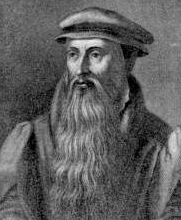

John Knox (1513 – 1572) was a Scottish religious
reformer who played the lead part in reforming the Church in Scotland in a
Calvinist manner. He is widely regarded as the father of the Protestant
Reformation in Scotland, and of the Church of Scotland. Knox is first mentioned
as a priest in 1540, and in 1543 he was still an ordained Catholic clergyman.
Knox's actual conversion to protestant faith was probably the result of his
friendship with George Wishart. Wishart, who had returned to Scotland in 1544
after a period of banishment, had preached in favour of the reformation. Knox
became one of Wishart's closest associates, and he followed him everywhere. In
December 1545, Wishart was seized and burnt at the stake in St Andrews. Knox
spent eighteen months as a galley-slave. On his release Knox found that, in the
existing state of the country, he could be of little use in his beloved
Scotland. For nearly ten years, accordingly, he submitted to voluntary exile
first to England than to Geneva, Italy. He returned to Edinburgh in 1559. Knox
at once became the leader of the Reformers. He preached against "idolatry" with
the greatest boldness, and with the result that what he calls the 'rascal
multitude' began the 'purging' of churches and the destruction of monasteries.
Politics and religion were closely intertwined; the Reformers were struggling to
keep Scotland free from the yoke of France, and did not hesitate to seek the
help of England. Knox negotiated with the English government to secure its
support, and he approved of the declaration of the lords of his party in October
1559, suspending their allegiance to the French regent on the Scottish throne
(Mary of Guise). The death of the latter in
June, 1560, opened the way to the end of hostilities and an agreement
leaving the settlement of church questions to the Scottish estates. The
doctrine, worship, and government of the Roman Catholic Church were overthrown by the
parliament of 1560 and Protestantism was established as the national religion.
Knox, assisted by five other ministers, formulated the confession of faith
adopted at this time and drew up the constitution of the new Church — the
First Book of Discipline. The church - or Kirk - was organised on something
approaching presbyterian lines. Priests were replaced by ministers (from the
Latin for servants), with each parish governed by the Kirk Session of elders,
but at this time the proposed replacement of bishops with 'superintendents' was
only partly implemented. ![]()
credit:
The text was extracted from Wikipedia The Free Encyclopedia under GNU Free Documentation Licence.